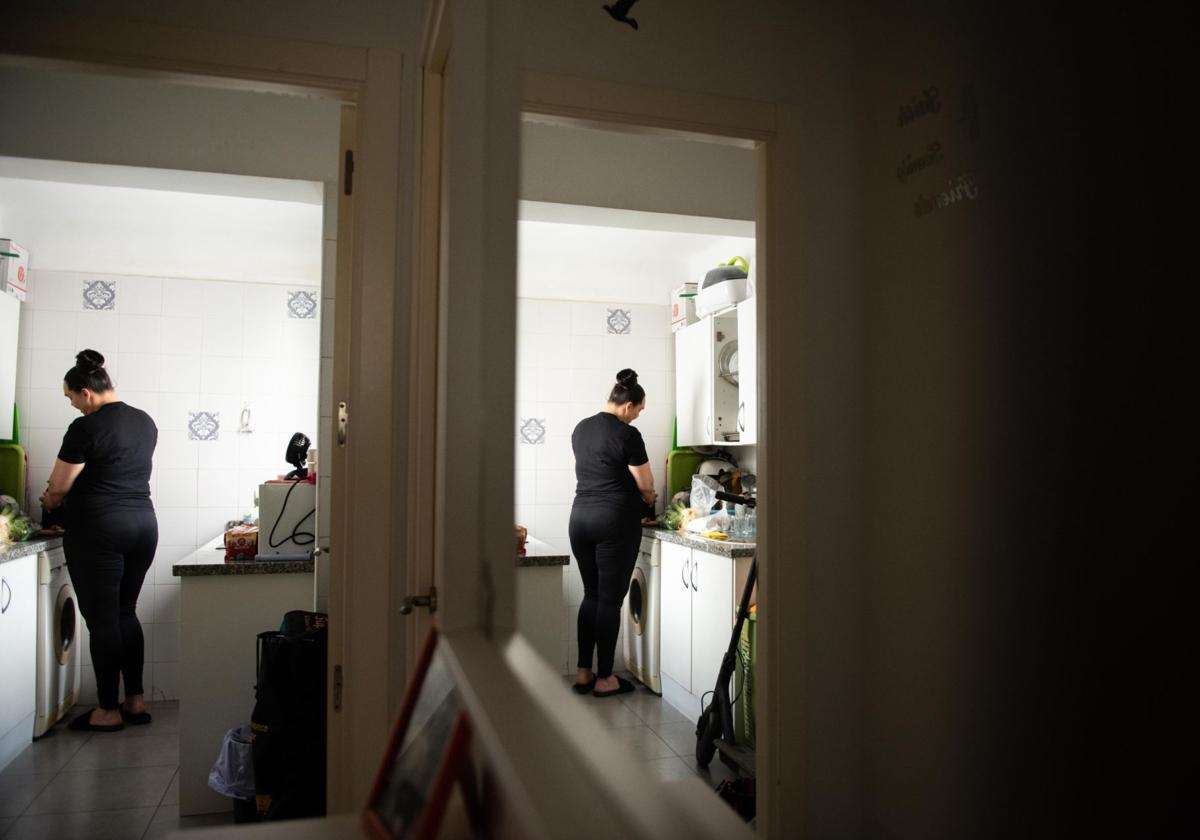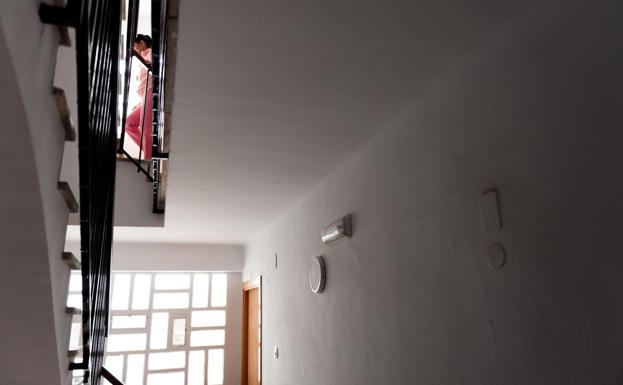
Sections
Highlight
Sections
Highlight
A block of flats with pretty balconies in the centre of Malaga city, flanked by tourist apartment buildings. A courtyard with whitewashed walls and stairs which lead to a rooftop terrace with stunning views over the city where the residents organise social events to which everyone brings a dish from their country of origin. The president of the community is 39-year-old Venezuelan Andrea, a chemical engineer like her husband: "This is a quiet place, it's a good place to live", she says.
The block has 20 flats and 21 families live there. They pay rents of around 200 or 300 euros per month. "In no way market prices," say those who manage the property, this refuge provides dignity, it is beautiful, the kind of beauty that everyone in the area should be entitled to.
This Cáritas project, known as Casa Belén, started in 2021 and offers people stability and long-term help and acts as a springboard to a fully autonomous life. The fact that a rent is charged, that the tenants have signed a rental contract, that it is not free accommodation, has the same meaning: "This is not charity," the team, headed up by María Jesús Oliveira, head of the social action area of Cáritas in Málaga, and Pilar Delgado, technician of this project, explain.
The people who come to this Cáritas facility - of the many that the organisation has in the province and that provide shelter to around 500 people in total, depending on how vulnerable the person is, are referred from the local Cáritas branches. They respond to the type of people who need a push and a little bit of leeway to acquire total autonomy, giving them peace of mind to move forward without having to worry about paying the rent, which has become so expensive in Malaga and many other Spanish cities.
For example, there is a couple who were studying and had an unplanned baby: in this shelter they have a space for the years it takes to complete their education and to be able to make the leap into the labour market under better conditions. "For this project, we are looking for people who want to get ahead and we accompany them in their employability. In December, a girl came out of this house and this house served as a springboard for her: she has set up an African hairdressing salon".
Many of the people living in this building work, but even so they cannot afford the exorbitant market prices: "If they earn 1,200 euros and the rent costs them 1,000 euros, let's see what they can do". Ernesto Juárez, secretary general of Cáritas Málaga, provides data that informs about the real estate problem: "Housing is the biggest constraint faced by the families who come to Cáritas. The latest report by Foessa - the institution's research service - indicates that 20% of low-income households have to spend 70% of their income on housing and our report for the year 2023 states that almost 20% of the families who ask for help from our organisation live in rented rooms, and they are no longer just single people, but also couples, even with children." As a result, 26% of the direct aid given by Caritas in Malaga is for housing, and in the last year for which data is available, more than 630,000 euros were allocated to this purpose.
20% of those asking for help from Cáritas in Malaga
live in rented rooms, and they are no longer only single people, but also couples, even with children.
Juárez emphasises that while in the European Union the public rental housing stock is eight per cent, in Spain it is barely 2.5%. "We need to strengthen housing policy; we need a commitment from all the administrations," he says. In the meantime, the organisation will continue to act as a support network, a resource, a cushion... whatever is needed, in places like Casa Belén, where Bea, 43, knows that her children live in a better environment to become healthy and good adults.

Andrea (figurative name) is 39 years old, Venezuelan and came to Spain with her husband who, like her, is a chemical engineer, both with experience working for the state-owned PDVSA. "We had a status that was later destroyed, but it was worth it to save our son. And we are still standing every day. It's hard to stand firm, but we do it," says Andrea who, she reveals, at the time, when they made the decision to cross the Atlantic, had a risky pregnancy: "We wanted to have new opportunities and as healthcare has deteriorated so much in Venezuela, there was a possibility that I would lose the baby, so we came to Spain".
They arrived in the country as applicants for international protection and received shelter and support from CEAR (Spanish Commission for Refugee Aid). At the beginning, as they had no documentation to work, her husband started to work as a volunteer in Cáritas in Ciudad Jardín. They ran out of support from CEAR and went to live on their own. They rented a flat in El Palo for 500 euros: "It was very difficult for us to pay," Andrea explains. "Now my husband is a stand fitter at trade fairs and until a week ago I was a chambermaid," she explains. But instability has been the norm in her working life.
-kObB-U2301720911143Y0H-624x385@Diario%20Sur.jpg)
Their great ambition is to get jobs as chemical engineers, and with this goal in mind they continue to train, study English and take courses. Their problem in job interviews is that they are asked what has happened in the last four or five years, why this gap in their career, but the problem is that the recognition of academic qualifications takes all that time.
"We are going to make it", she says on the rooftop of the building in the centre of Malaga where they have found a beautiful, welcoming home, stability and a platform to build their future: "I know we are going to make it", she insists, excited and determined.
The family came to this house in 2021. When they lived in El Palo, they were active in the neighbourhood and received help there as well. It was there that they were informed of the existence of the house in which they now live, their situation was analysed and the organisation, Caritas, determined that they were a suitable family and that they would take advantage of this refuge to prosper.
"Otherwise, we would be on the street", Andrea now admits. As resources, the family relies on the jobs that the couple is finding and which they have to supplement with the minimum vital income of which they are beneficiaries. In addition, they are users of the Lagunillas low-price shop where they buy fruit, vegetables and other basic necessities at a better price after the evaluation carried out by the town hall's social services department.
It is very hard for a family that was well off in their country of origin to find themselves in this situation. But the roof provided by Cáritas is a safety net, a platform, which gives them security and stability so that they can gradually build a completely independent life.
Bea (figurative name) is 43 years old and the mother of four children. The eldest, aged 24, is now independent. So she has been living here with the other three, aged 19, 16 and 13, for five years now. "Before I came here, I had a very difficult path," she says. She hasn't stopped working since she was eight years old, but she has almost always worked in the underground economy, so she has barely half a dozen official contributions to her name.
When her children were young, she was cleaning twelve houses which allowed her to fit work around family life, because the people who employed her let her take the children with her. She put up posters offering her services as a cleaner around Teatinos and she cleaned a lot of homes in that area. She even set up a cleaning company that did not prosper because she could not find workers as committed as she was.
After working as a cleaner, she worked on building sites, as a bricklayer, painted blocks of flats, restored fireplaces, restored houses, assembled infrastructures for shows, installed air conditioners, even took on loading and unloading work, studied electricity...but was always paid in cash. "I used to earn 60 euros a day installing air conditioners, not bad, but I wasn't insured. A friend gave me the job. People help as they can", she says.
"My life is stable now," she says, although buying meat, chicken, fish "is still a miracle", she says, pointing out that she has three hungry mouths to feed. However, she now has the peace of mind of having a roof over her head and long term help, to give her time to organise her life, and with support and follow-up by Cáritas professionals.
But for her, this non-stop work, this taking on extremely tough jobs, has led to health problems and she is only just 40. "The other day I was working 18 hours, but then I couldn't get out of bed for another two days," she confesses. But she is confident that she will get the right job. If anyone is interested in offering Bea a job, please contact Cáritas Diocesana de Málaga.
Publicidad
Publicidad
Publicidad
Publicidad
Esta funcionalidad es exclusiva para registrados.
Reporta un error en esta noticia


Debido a un error no hemos podido dar de alta tu suscripción.
Por favor, ponte en contacto con Atención al Cliente.

¡Bienvenido a SURINENGLISH!

Tu suscripción con Google se ha realizado correctamente, pero ya tenías otra suscripción activa en SURINENGLISH.
Déjanos tus datos y nos pondremos en contacto contigo para analizar tu caso

¡Tu suscripción con Google se ha realizado correctamente!
La compra se ha asociado al siguiente email
Comentar es una ventaja exclusiva para registrados
¿Ya eres registrado?
Inicia sesiónNecesitas ser suscriptor para poder votar.